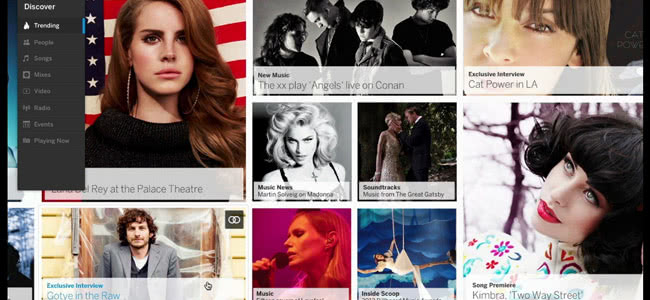Under the direction of co-owner Justin Timberlake and investor group Specific Media, the revamped and relaunched MySpace officially opened to the public earlier this month, with a concerted focus on music discovery, sharing, and streaming, with a proprietary 27 million song strong library that’s pegged as a ‘Spotify killer’.
MySpace may be looking to regain its position amongst social media royalty, drawing a modest 26 million US users on launch, but the service has already run afoul of the music it’s trying to promote, with accusations that the free music streaming featured on the site is being used without permission from the artists.
Merlin, a global rights licensing agency launched as a co-initiative from independent labels in 2008, that represents the likes of indie majors like Arcade Fire, Vampire Weekend and labels like Domino, Beggars Group, and Merge, claims that its license with MySpace expired over a year ago but is still being used by the site to access and stream music without consent.
Independent groups AIM, A2IM, WIN and AIR (Australian Independent Record Labels Association) have issued a joint statement slamming MySpace for their “regressive and outdated approach,” emphasised their disappointment with the service’s abuse of independent music, and “urge any service acting in this way – and especially one part-owned by the three remaining major record labels – to think again.”“We urge any service acting in this way – and especially one part-owned by the three remaining major record labels – to think again.”
The licensing from Merlin accounts for over 10% of the recorded music market, and the “largest and most compelling basket of rights outside of the major labels,” reads the combined press statement from the independent representatives, who write: “It was therefore hugely disappointing when, under new ownership, Myspace re-launched this month, streaming our members’ music without their permission and without compensation.”
Neda Azarfar, a spokeswoman for Myspace, told The New York Times that the company decided not to renew its contract with Merlin, adding that if any songs had appeared on the newly relaunched site from its member labels, “they were likely uploaded by users” and would be removed if requested by the label.
A tactic that equates to illegitimate music services like Grooveshark and the numerous music piracy websites, who simply host free streaming music without paying for the rights to licensing, and simply respond to takedown notices for their copyright-breaching content.
Rich Bengoff, President of the American Association of Independent Music (A2IM) writes in the joint statement that:
“On behalf of a significant number of independent label members of A2IM who had expressed to us serious concerns and dissatisfaction with the re-launched Myspace, we met with Myspace at Midem. We hoped that our meeting would assist them in getting in front of and rectifying their missteps with our community.
A2IM was dismayed and disappointed that Myspace’s response to the message that we were delivering was defensive and lacked a meaningful commitment to treat independent labels and our artists with the respect that our community’s contribution warrants. The last several years have seen the launch of a number of fantastic digital music platforms that understand and appreciate the contributions of independent artists and labels with more than just words.
It is troubling that the new Myspace seems to be following the practices of so many failed services that made the mistake of not understanding the importance of independent music to their own peril.”
AIR General Manager Nick O’Byrne echoed Bengoff’s disappointment with MySpace’s hypocritical use of unlicensed music, saying that “given Myspace’s history with independent music and the company’s rhetoric about its reincarnation as a platform for musical discovery, the current situation with regards to licensing independent music is insulting to our sector.”
“Their refusal to deal with independent labels respectfully implies that they see independent music as less valuable than that of the majors which has resulted in them re-launching an inferior music platform to consumers,” said O’Byrne.“The current situation with regards to licensing independent music is insulting to our sector.” – Nick O’Byrne, AIR
Marin Mills, founder of the Beggars Group who uses Merlin for representation for digital licensing, shared O’Byrne’s views. “We would also expect that a service that is jointly owned by the major labels would respect our rights rather than hide behind the DMCA in exactly the same manner as pirates and companies like Grooveshark, but it appears that neither of these assumptions are true and that the new owners of Myspace just see independent music as a free ride.”
“We are sick and tired of services that seem to think that our music is worth less than the majors,” said Alison Wenham, chairman of the World Independent Network (WIN) and the UK’s AIM. ” The WIN Manifesto clearly sets out the value we bring to the music industry, to artists and to fans.”
The serious movement against MySpace certainly doesn’t help Specific Media’s efforts, which originally bought Myspace, alongside minority partner Justin Timberlake, for a paltry $35 million, six years after News Corporation dropped a whopping $580 million for the business.
The new owners had been drip-feeding details about the redesign since last September, along with the shock announcement they’d be deleting all old profiles and data in the refresh, and now that it’s officially in the hands of the public, the new look MySpace has had 27.4 million unique visitors in the US since December.
That’s a far cry from its glory days however, back in 2008 MySpace netted a peak of 76 million visits – which pales in comparison to Facebook’s 148.5 million visitors.
Considering that the relaunched MySpace is already fighting an uphill battle to gain any major share of attention, the latest dispute over its music licensing could see the site undone by the very musicians, labels, and artists its abusing to promote it’s stylish new iteration.




































